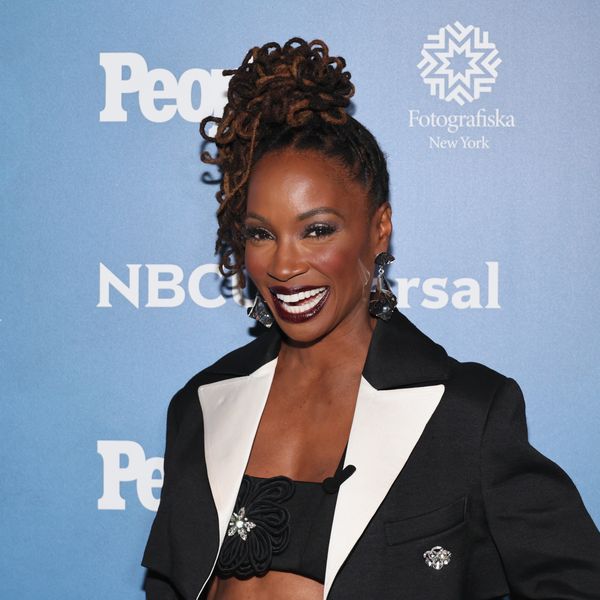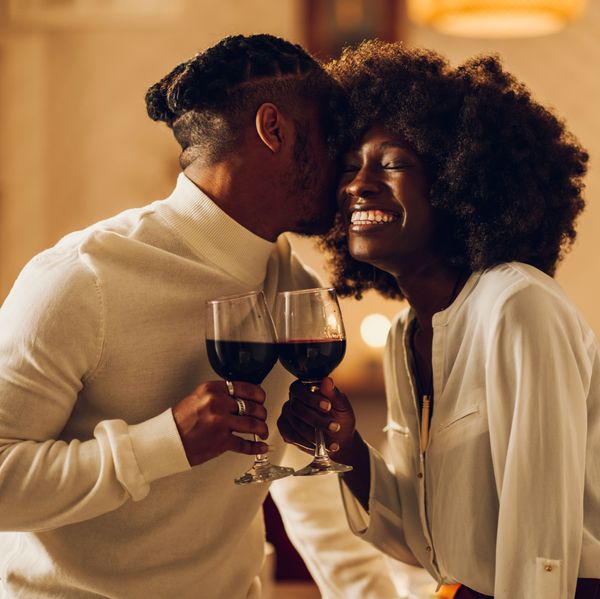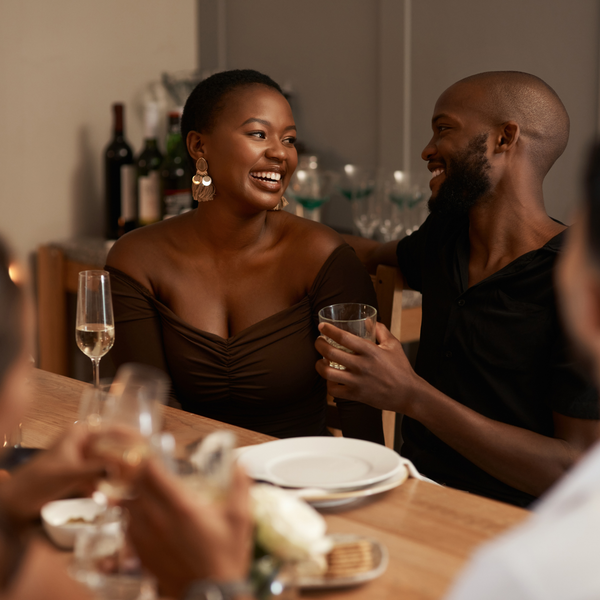‘Found’ Star Shanola Hampton Spent $532 On Her Wedding. 6 Reasons Why That’s Beyond Bomb.

A few weeks ago, a girlfriend asked me to name a female celebrity who I personally found to be physically beautiful. Although it took me a second to run through my mental Rolodex, two people who came to my mind were actors Javicia Leslie (who I first “stumbled upon” via the series Chef Julian) and Shanola Hampton.
As far as Shanola goes, I was first introduced to her via the independent film Things Never Said (which also starredOmari Hardwick). Anyway, it’s always so cool to watch people evolve in their respective fields and Shanola has definitely become a household name thanks to the role that she currently plays in the NBC series Found.
And y’all, my fondness for her certainly went up a few notches after I peeped a few things that she recently shared in a PEOPLE interview. In 2025, she will have been married to her beloved for 25 years (salute!). As she was talking about their wedding day, she shared that they eloped in Las Vegas, that it only cost them $532, that she wore a thrift store dress and “Erykah Badu headwrap” and that she only has one regret.
Because they were “too broke” at the time to afford a full elopement package, they didn’t get a videotape of her nuptials (they do have pics, though). She also said that a big part of the reason for the regret is because she adored her husband, Daren’s vows: “Gosh, if we could only have seen what it was going to be...” INDEED.
As a marriage life coach, something else that I appreciated about the article is when she said, “Yes, you learn and grow and evolve. But you don't change each other by marrying each other." Lawd, if more people really got that, less folks would end up in divorce court (check out “The Right Relationship IMPROVES Not CHANGES You”).
However, the main reason why I’m using Shanola’s words of wisdom as the intro for this piece is because I know far too many couples who either keep putting off wedding plans to save thousands of dollars for a ceremony or they are far too stressed out because they think a big wedding is something that absolutely must be done.
Well, between what you just read and what you’re about to read, here’s hoping that you’ll realize (and accept) that there are all kinds of benefits that come from taking the “less is more” approach — yes, even when it comes to wedding days.
First, the Difference Between a Micro-Wedding and Eloping
 Giphy
GiphyI promise you that I don’t get why so many folks damn near hyperventilate whenever they hear “small wedding” (or micro-wedding which is apparently the popular term right through here). It’s like they are automatically wired to think that means making some wack concessions or that they automatically have to elope. Well, before getting into some actual facts that come from taking the minimalist approach to one’s nuptials, let me just say that just because you don’t end up having 500 people on your wedding guest list or three choices of cuisine at your reception, that doesn’t mean that you have to end up at the courthouse in a pair of sweats.
For one thing, treat yourself to TikTok and put “Black elopements” in the search field. Yes, even if you do elope, you can still dress to the nines (or 12s because you don’t have to spend as much money as you would on a wedding), it can be at another location (like a beach or even a church) and then you have the rest of the day to do whatever you want: post up in a swanky hotel, fly some place that requires a passport stamp for your honeymoon — whatever. And, since you’re eloping, you and your bae can be totally off the grid the entire time.
However, a micro-wedding is a bit different. Basically, it’s what happens when you do pretty much everything that you wanted to do for your wedding only, it’s with a guest list of 50 people or less. And I’m pretty sure you can see the immediate benefit that comes with taking that approach: you’re able to save money — and y’all, since reportedly a whopping 56 percent of couples went into debt just from their wedding alone and financial issues continue to be a leading cause of divorce, well, yeah, don’t diss a micro-wedding. It definitely has its perks.
Okay, but there are other researched and fact-based reasons why it can be a wise move to go smaller as far as weddings are concerned. Here are just six of ‘em.
1. Expensive Rings (Oftentimes) Predict Shorter Marriages
 Giphy
GiphySome of y’all may remember the student last year who went viral on TikTok and then became a news story thanks to his under-twenty-bucks device that let teachers at his school know if their engagement/wedding ring was the real deal or not (chile). Hmph, all it did was remind me of the De Beers origin story of engagement rings and how I will continue to share it until each and every cow comes home. Basically, the company was going broke, it came up with the slogan “a diamond is forever” and folks have been drinking the Kool-Aid ever since. SMDH. And what’s really wild is while people actually think that saving up three months of a salary is a sign of one’s everlasting love, there are articles out in cyberspace with titles like “Why an Expensive Ring May Predict a Short Marriage.”
In this one, it features a study that said the people who spend somewhere between $2,000-$,4,000 have a higher chance of divorcing. The reason? Eh, I’d venture to say that it’s probably not so much about the ring itself but the motive behind why someone wants a really expensive one, how realistic their expectations are about marriage and their financial future, and if they want to be a wife or just a bride — and yes, there is a really big difference, chile (check out “Do You Want To Be A Wife? Or Do You Just Want To Have A Wedding?”). Not to mention the stress that the groom-to-be may have experienced to make the sacrifice (especially if it was above his means). Either way, take note.
2. Smaller Weddings Can Be Exquisitely Intimate
 Giphy
GiphyI have a little love sister who has been engaged for over three years now. Y’all, it can’t be said enough that the purpose of being engaged is to plan your wedding — literally that is what the time is for. Know what else needs to be reiterated? The fact that some studies say that the longer you’re engaged, the more likely you are to divorce. One study gets even more specific than that. It says that if you’ve been engaged for more than 27 months, the intimacy between you and your partner will suffer during its newlywed years and yes, it could lead to a serious breakdown in the relationship.
That’s why I’ve been telling her that instead of her and her fiancé damn near killing themselves to pay for an over-the-top wedding, they can have a smaller one — one that is more intimate and can be just as beautiful. If you don’t believe me, check out Brides' “40 Small Wedding Ideas for an Intimate Affair” piece. Personally, I’ve always liked the idea of renting out a really nice vacation house and having loved ones all stay together while getting married at the same location.
Sometimes big weddings are so big that a lot of the “closeness” is lost and certain moments are a complete blur. With a smaller wedding, the chances of these things transpiring end up dropping…significantly so.
3. The Planning Process Is Far Less Stressful
 Giphy
GiphyI’m telling you, when it comes to this topic, the facts just keep on coming. Boy, there is nothing like working with an engaged couple while they are planning their wedding — if that doesn’t reveal some things about what their relationship is actually made of, nothing will. Hey, but you don’t have to take my word for it.
A few years back, Business Insider published an article entitled, “Wedding planners reveal the 10 biggest red flags that a couple won't make it.” One of the things that it said was, “From unrealistic budgets to family conflicts, there are multiple problems that can arise during the wedding-planning process that can create rifts in a marriage or even lead to divorce.”
Yeah, they ain’t neva lied because if you don’t know how to keep your emotions in check, how to negotiate, how to set boundaries with family members and friends (bookmark that one), and how to compartmentalize your wedding with the rest of your relationship — you shouldn’t ignore that; it’s actually showing you something about your dynamic that you should address prior to jumping any broom.
Anyway, the main moral to the story when it comes to this one is if your wedding is small(er), there is less to plan…and if there is less stress, then your relationship won’t end up having to endure so much pressure. #justsaying
4. Less Folks? Less People to Please.
 Giphy
GiphyAh yes, the bookmark. Listen, if you are a bona fide people-pleaser (check out “How To Stop Being A People-Pleaser & Start Doing You”), the wedding planning process is going to test you in ways that you’ve never been tested before! This will especially be the case if you have some pretty poor boundaries with your loved ones (and/or perhaps his) to begin with. It’s another message for another time that you really need to involve people in the planning process who know that it’s you and your fiancé’s day (NOT JUST YOURS), that they should just be supportive and encouraging (not demanding and entitled) and it only needs to consist of who will make it be about your needs over their wishes.
For now, I’ll just say that when your wedding and guest list are smaller, there are far less people to, well, please. And again, if you are a people-pleaser (or a people-pleaser in recovery) that can really take a load off.
5. Cheaper Weddings Lead to Happier Marriages. Science Says So.
 Giphy
GiphySo, about a decade ago, CNN published the article, “Want a happy marriage? Have a big, cheap wedding.” The gist of it simply stated that “a new study found that couples who spend less on their wedding tend to have longer-lasting marriages than those who splurge.” The first thing that comes to my mind on this one is simply, that some people marry people and others “marry” weddings. Now does this mean that every couple who has an opulent wedding day is shallow and superficial or that they are getting married for the wrong reasons? Of course not. For one thing, some folks can afford to have an expensive wedding (meaning, it won’t put them into debt to have one).
Plus, having extravagant taste doesn’t mean that someone’s love isn’t real. AT THE SAME TIME, THOUGH, having a big wedding thinking that it proves something? It really proves nothing as far as the foundation of a healthy marriage is concerned. Yeah, my biggest takeaway from this point is when you just want to start the “becoming one” process with the man who you love, the price tag really doesn’t matter. They way it should be.
6. Finances Can Go Elsewhere
 Giphy
GiphyLast year, CNBC published the article, “Gen Z, millennial couples say it’s too expensive to get married in this economy.” Boy, and if this doesn’t prove the ultimate point that I’ve been trying to make this entire time, nothing will. Y’all, when you really want to be with your “one”, who cares about how beaded a dress is, how expensive a venue should be or how tall a cake looks — and so, why should you wait damn near forever until you can pay for all of those things? A party is nothing compared to a lifetime partner. That said, STAY FOCUSED.
Besides, all of those thousands that you saved by not having a big wedding can go to things like a downpayment on a house, a really long international honeymoon, a new car, a savings account for your future children, a retirement account — the possibilities really are endless and all of them can help your marriage to have a more solid footing.
____
So, if you initially read the title of this and low-key got cynical, maybe now you get just how “onto something” Shanola and her husband — again of almost 25 years — actually were. Smaller, less expensive weddings can be absolutely priceless. For all sorts of reasons. As you just read.
Again, salute to them and, if you are (currently) engaged, wise wedding planning wishes to you.
Let’s make things inbox official! Sign up for the xoNecole newsletter for love, wellness, career, and exclusive content delivered straight to your inbox.
Featured image by Dia Dipasupil/Getty Images
Your December 2025 Monthly Horoscopes Are All About Surrender & Alignment
December is about letting go. We end the year with the need for more peace, reflection, and rejuvenation, and that is exactly what December is providing for us. The Sun is in Sagittarius, and anything is possible. This is the month to believe in that and to know that the universe is supporting you. With a Supermoon in Gemini as we begin the month as well, we have an opportunity to gain the closure we have been looking for this year and to wrap up old projects, ideas, and communication breakthroughs.
This is the month to make your peace the priority and let go of trying to control the way the tides are turning. Trust in your new beginning, and give yourself time to prepare for it this month.
A big part of the clarity that is coming through this month is due to Neptune going direct in Pisces on December 10, after being retrograde here since July. With Neptune now direct, we are able to see our inspiration and creativity a little more clearly, providing the perfect energy for dreams and manifestation to be built upon. The smoke is clearing, and it’s up to you to decide what you want to do with this newfound clarity that this transit is bringing. Mercury also moves back into Sagittarius on December 11, which is great for communication and clarity, and the adventures you were trying to see through at the beginning of November come around for you again with greater purpose and support.
On December 15, Mars enters Capricorn until the end of January 2026, and this is the extra push we need to make important changes and to be on the path towards greater abundance, stability, and prosperity. Mars in Capricorn takes care of business, and we have extra energy at our disposal during this time to do so. This transit is an ideal time to focus on your career or financial goals for next year and to start putting some of these plans into motion now. A few days later, we have the New Moon of the month, which will be in Sagittarius on December 19, and this is the perfect New Moon to manifest.
The energy is high, magic is in the air, and it’s all about moving forward with the new beginnings that are inspiring you and bringing you joy to think about right now.
Capricorn Season officially begins on December 21, and this earth sign energy is how we heal, gain closure, and build new foundations in our world. With Venus also moving into a Capricorn a few days later, there is something about peace, prosperity, and security that we are gaining in life and in love as we close out the year, and this is what we need right now. This month is about reflecting on what was, letting go of old hurt, and renewing. December is an ending and a new beginning in one, and there is magic in this space to be created.
Read for your sun and rising sign below to see what December 2025 has in store for you.
 AriesKyra Jay for xoNecole
AriesKyra Jay for xoNecoleARIES
December is a full-circle moment for you, Aries. You are seeing the gifts in your world and have a lot of gratitude for the way things have come about for you as of late. There are culminations in your world that are providing you with more abundance, stability, and community, and you are exactly where you are meant to be this month. With the Sun in a fellow fire sign and in your 9th house of travel for most of the month, December is a good time to get out of your comfort zone, explore the world around you, and get your body moving.
Mars, your ruling planet, also makes a change and moves into Capricorn on December 15, which will fuel your inspiration and power in your career space. You are making a lot of professional progress as we close out the year; however, make sure to be more mindful of your competitive drive right now. The New Moon on December 19 is the perfect opportunity for you to create some new plans and goals when it comes to traveling, education, and where you want to gain some new inspiration in your world. Overall, this is a month of things coming together for you serendipitously.
 TaurusKyra Jay for xoNecole
TaurusKyra Jay for xoNecoleTAURUS
December is about trusting your intuition, Taurus. You have a lot on your mind this month, and it’s best to delegate, communicate, and allow yourself some relief by opening up to someone and not feeling like you have to hold everything in. As we begin the month, we have a Supermoon in Gemini happening in your house of income, and the plans and projects you have been building here come to fruition for you now. This is the time to gain clarity on your financial world and to take a look at what spending habits you want to let go of here as well.
With Venus in your 8th house of shared resources for most of the month, you are doing a cleanse on your commitments, partnerships, and business ventures. You are taking a look at what you want to dedicate yourself to in the future, and what commitments you may need to let go of now in order to be in the space you truly want to be, both financially and within some of your relationship dynamics. Before we end the month, we have a New Moon in this same area of your chart, and it’s time to look at the opportunities that are presenting themselves and to trust your internal guidance system to lead you forward.
 GeminiKyra Jay for xoNecole
GeminiKyra Jay for xoNecoleGEMINI
You are moving forward fearlessly this month, Gemini. December is your month of love, passion, and dignity, and you are owning the light that you shine. We begin the month with the last Supermoon of the year, happening in your sign, and you are stepping up to the plate. You are showing up, owning how much you have grown this year, and allowing yourself to heal while also acknowledging that you have done your best and you deserve to have fun in the midst of the changes you are creating.
Mercury, your ruling planet, is officially out of retrograde, and you can use this energy to the fullest potential now. With Mercury in your 7th house of love, it’s time to speak from the heart and to talk about the things that matter and that are inspiring you right now to your loved ones. You never know what kind of epiphanies you may have when you open up the conversation to others. Before the month ends, you have a New Moon in this same love area of your chart, and this New Moon is all about manifesting romance, commitment, and abundance in your world.
 CancerKyra Jay for xoNecole
CancerKyra Jay for xoNecoleCANCER
December is an opening for more love, more joy, and more freedom in your life, Cancer. You have come to a place where you hold so much gratitude in your heart for where you are today and where your heart is shining, and things come together for you with more ease right now. With the Sun in your 6th house of health, work, and daily routines for most of the month, you are getting your ducks in a row while also putting more energy and effort into taking care of yourself, your priorities, and your well-being. This month surprises you in many ways, and it’s because you are showing up.
Mars and Venus both move into your house of love, relationships, marriage, and abundance this month, and you are making strides in your love life. You have both of these opposing forces on your side and are being recognized for the love you are while also receiving the love you want. This month, overall, is about focusing more on the positives in your world and letting your heart have its joy. Before December comes to an end, there is a New Moon in Sagittarius, and this is the perfect opportunity to create the plans you want to see through next year, especially when it comes to your work life, colleagues, business ventures, and health.
 LeoKyra Jay for xoNecole
LeoKyra Jay for xoNecoleLEO
The scales of karma are balancing, and they are balancing in your favor this month, Leo. December is your month of truth, and of seeing it clearly in your world. The Sun is in your house of romance, pleasure, and happiness for most of the month, and it’s time to relax, be in the present moment, and allow what is meant to be, to be. With a Supermoon in your 11th house of manifestation as December begins, this is a powerful month for seeing your dreams come to fruition, and for feeling like the intentions you have set this year are finally here for you now.
Mars also moves into your 6th house mid-month, and this is the perfect energy to have to move into the new year. You have extra energy at your disposal right now and are feeling fearless with what is possible for you and your daily routine. Before the month ends, we also have a New Moon in a fellow fire sign, Sagittarius, and this is a breakthrough moment for you and your heart. December, overall, wants to show you how loved and supported you are and will be doing so in magical, unexpected, and concrete ways.
 VirgoKyra Jay for xoNecole
VirgoKyra Jay for xoNecoleVIRGO
December is a month of victory, Virgo. You are showing up and experiencing some new successes in your world that move you forward on your path in life. With a Supermoon in your 10th house of career as we begin the month, the effort and intentions you have made this year come into full bloom, and you are being recognized for who you are and the good work you have done. This month is all about showing up and allowing yourself to be seen and loved, knowing that you deserve the support and opportunities you are receiving.
Mars moves into Capricorn on December 15, which brings the passion and excitement into your love life, hobbies, and little pleasures in life that light you up. You want to have fun this month and are going to be walking into the new year with this fearless, happy, and spontaneous energy within you. Before the month ends, Venus also enters Capricorn, and in this same area of your chart, you have a lot to look forward to and believe in right now. Overall, December wants you to be happy and will be doing everything possible to make that happen for you. This is your month to shine, Virgo.
 LibraKyra Jay for xoNecole
LibraKyra Jay for xoNecoleLIBRA
December is a month of opportunity for you, Libra. New doors open, and you are financially making breakthroughs this month because of it. December begins with a Supermoon in your 9th house, and you are getting a clearer view of where you have been making strides in your life and how it has all brought you here to this present moment of freedom. This month is showing you what happens when you are fearless with your purpose and when you believe in yourself and what you are worthy of.
Moving further into December, Mars moves into your 4th house of home and family mid-month, and you are closing out the year in your safe spaces. You are spending more time with your loved ones and taking the time to quiet your mind and listen to what your heart has been telling you. Before the month ends, we have a New Moon in Sagittarius, happening in an area of your life that deals with communication. This is a great time for getting the answers you have been looking for and for feeling more clear-headed and confident about the decisions you are making as you move into the new year.
 ScorpioKyra Jay for xoNecole
ScorpioKyra Jay for xoNecoleSCORPIO
Patience is a virtue this month, Scorpio. December is all about remaining patient and vigilant with what you are creating in your world, and knowing that the universe has your back. It’s time to be reminded of the power of hope, and this month is an opening to greater clarity in your life. There is a lot of energy in your financial zones right now, and this is providing you with new opportunities and new insight; however, the speed at which things come about for you may feel daunting. Keep your head up and eyes focused on what you want and know that you are more than worthy of receiving it.
With Mercury in your 2nd house of income this month, December is a good time to plant new seeds and to think about where you want to be financially a month from now or even a year. This month is asking you to think bigger and to think more long-term so that you can set the appropriate plans into motion now. We also have a New Moon in your house of income before the month ends, and this is when you will see more of your dreams come to fruition in this area of your life, and have more opportunities to build. Overall, December will be teaching you a lot, Scorpio.
 SagittariusKyra Jay for xoNecole
SagittariusKyra Jay for xoNecoleSAGITTARIUS
Sagittarius Season is here, and there is a lot in store for you this month, Sag. December is all about what you are dedicating yourself to. It’s about setting your intentions and putting the work in to back up your dreams, and about getting things in order so that when the new beginnings come, you are ready for them. The Sun and Venus are in your sign for most of this month, and there are a lot of eyes on you right now. You have the potential to create a new beginning for yourself, and it’s time to invest in yourself, your love life, and your dreams.
Mercury moves into Sagittarius on December 11, and this is giving you another opportunity to see through some of the plans that you had initiated in November. Mercury was retrograde in your sign last month, and there may have been some disruptions to your vision and plans for the future, and now this energy is turning around for you. Before the month ends, we also have a New Moon in Sagittarius, and you are walking through new doors fearlessly. You are catching others by surprise by your growth this month, and you are thinking a lot about your purpose, future, and plans for the new year.
 CapricornKyra Jay for xoNecole
CapricornKyra Jay for xoNecoleCAPRICORN
December is all about the vision, Capricorn. You are moving through a lot of changes and transformations this month, yet they are giving you a chance at a new beginning in the process. You are focused more on the future and what goals you want to manifest for yourself right now, and are ready to let go of what hasn’t been working for you. With the Sun in your 12th house of closure for most of December, this is your time for healing, but remember, healing doesn’t have to be isolating or boring; you can thrive while you renew, and you are this month.
Mid-month, the excitement picks up for you, and you are feeling more energized than you have in a while. Mars moves into Capricorn until the end of January 2026, and you are being proactive with your goals, intentions, and passions. You are a force to be reckoned with this month, and you are making things happen for yourself with confidence. Capricorn Season officially begins on December 21 this year, and this is definitely speeding up your healing process. You are breaking free from what was, and with Venus also moving into Capricorn before the month ends, you are leaving this year in high spirits and with love opening a new door for you.
 AquariusKyra Jay for xoNecole
AquariusKyra Jay for xoNecoleAQUARIUS
December is all about community, creativity, and manifestation, Aquarius. This is the month to work together with others to help bring your dreams to life. You are in a space of inspiration, empowerment, and beauty, and are creating more of this energy around you and in your world. Look out for what support comes your way this month and know that you don’t have to do everything alone to succeed. With the Sun in your 11th house of manifestation and friendship, your intentions are coming to fruition, and it’s time to celebrate with the people you love and to own how far you have come this year.
On December 19, we have a New Moon in Sagittarius, lighting up your life in all of the best ways possible. This is your New Moon of freedom, victory, and magic, and you are seeing new beginnings appear that you were once just hoping for. Before the month comes to an end, Venus moves into your 12th house of closure, and after an active and successful month, you are ready to relax, heal, and give your heart some of the attention it has been asking for. You are moving into the new year with the need to release and renew what hasn’t been working in your relationships, and you are finally ready to.
 PiscesKyra Jay for xoNecole
PiscesKyra Jay for xoNecolePISCES
December is a big month for you, Pisces. You are making some huge accomplishments this month, and are feeling like everything you have been through this year has been worth it for these moments that are coming to fruition for you now. The Sun is in your 10th house of career and reputation for most of the month, and this is where a lot of your focus is right now. You are claiming your successes and putting yourself out there in ways that not only serve you, but that inspire others as well.
Neptune officially goes direct on December 10, after being retrograde in your sign since July, and you are finally seeing things a little more clearly. You are feeling renewed inspiration and passion in your life, and your intuition is your strongest asset right now. Before December comes to an end, we also have a New Moon in your 10th house of career, and what happens now not only changes things for you in the present, but it also opens new doors and what is possible for you in the new year as well. Overall, you are on top of your game this month and are owning the joy and empowerment you feel.
Featured image by Kyra Jay for xoNecole
I already know that this one is gonna hurt a few feelings. The reason why I say that is because, if there is one thing that (many) folks are going to take if they are looking to get a good night’s rest, it’s melatonin, chile.
How do I know? Well, aside from the fact that some people in my own world are hooked on it, it’s also been reported that as many as 27 percent of Americans rely on this particular supplement to catch themselves some nightly zzz’s. That’s why, when I peeped that a particular study about melatonin was damn near viral, I decided that I absolutely needed to use my side of cyberspace to get the word out.
You see the title of this piece. Unfortunately, it is not an exaggeration. If you give me a moment, I will try to explain what is going on and how you should move, going forward, if melatonin is something that you have been relying on in order to get a good night’s rest.
What Is Melatonin?
 Giphy
GiphyOkay, so what exactly is melatonin? It’s actually a hormone in your system that your body produces in order to regulate your circadian rhythm/sleep cycle. Since melatonin tends to kick in 1-3 hours before you turn in at night, that is actually why “losing an hour” (of sunlight) during this time of the year (check out “Is The Drama Of The One-Hour Time Change All In Your Head?”) can throw off your sleep patterns a bit.
If your body doesn’t seem to have enough melatonin naturally, you might find yourself taking a melatonin supplement in order to increase your melatonin levels, although it should go on record that melatonin is also used to treat seasonal depression; a form of reflux disease (GERD); migraines and headaches; fibromyalgia, and even certain types of anxiety. Melatonin also has a reputation for helping to regulate menstrual cycles and slow down the aging of skin and hair. Something else to keep in mind? When melatonin is in supplement form, oftentimes, it is synthetic, which means that it is made in a lab.
Okay, so clearly, melatonin is needed and, as a supplement, it has its benefits.
Then there is the other side of the story. One that just recently came out.
Why Is the Supplement Currently a Cause for Alarm?
 Giphy
GiphyGeeze. There really is no telling how many times I have shared one of my all-time favorite quotes in my content here: “The excess of a virtue is a vice.” Aristotle is the author and it is so very true — including when it comes to melatonin usage. Because here’s the deal: If you are relying on a melatonin supplement to get some sleep, it’s important to note that most health experts say that you shouldn’t take it for more than 1-2 months, tops.
One reason is because melatonin shouldn’t be a “solution” to your sleep problems, so if you can’t get rest without it after several weeks, it really is time to see your doctor. Another reason is because melatonin supplements do have some potential side effects including nausea, vomiting, irritability, restlessness and disorientation. And then there is what has recently come out about it: the possibility of heart failure and even death.
Wild, right? Here’s the deal about that. Did you know that, according to the American Medical Association, the FDA doesn’t regulate most supplements? So, in the case of melatonin, specifically, while one brand might contain a certain amount of it, another may have a ton more. And when someone uses melatonin, consistently, for 12 months or more, they put themselves at a whopping 90 percent increase of heart failure over those who don’t take the supplement at all (the same goes for individuals who have two melatonin prescriptions filled within 90 days of each other vs. those who don’t). Something else to keep in mind? People (involved in the study) who took melatonin were 3.5 times more likely to be hospitalized for heart failure than those who don’t use the supplement too.
Since this is relatively new research, experts are trying to get to the root of why all of this is the case; however, one cardiologist did say that sometimes insomnia itself is the result of an underlying health issue; sometimes one that has to do with one’s heart. So, taking melatonin might further mask a health problem that needs to be immediately addressed. Sleep apnea is one that he mentioned.
These are pretty alarming results, no doubt. Now does this mean that you should avoid melatonin like the plague altogether? Eh. It’s more like you shouldn’t be using it for more than a couple of months. You should talk to your doctor if you are “treating” your sleep issues with it. And it’s always best to find more natural approaches to getting things that you need into your body. When it comes to melatonin, specifically, I’ve got a few ideas.
Other Ways to Get More Melatonin into Your System
 Giphy
GiphyOkay, so what are some other approaches to getting melatonin into your body?
Eat foods that are high in melatonin. Some of them include almonds, fish, milk (which is why a cup of warm milk tends to help), mushrooms, grapes, pineapples and eggs.
Stay in the light as much as possible during the daytime. Something that I like is for it to be rainy, dark and cold (whatever haters — LOL). That’s why I had to adjust the twinkle lights in my living room during the daytime because your natural melatonin levels react to darkness. So, if you’re in the dark all day, that can have your levels all over the place come nightfall.
Make sure that your room is hella dark. Remember what I just said about darkness? Well, even dim light can suppress your melatonin levels. This includes your phone’s screen, okay? So, when it’s time to go to sleep — the darker your room is, the absolute better.
Go easy on the java. It doesn’t really make sense to drink coffee at night since it’s a stimulant; however, even if it’s your jam throughout the day, 1-3 cups should be your limit and definitely earlier in the daytime. The reason? Some studies reveal that caffeine has a way of lowering your natural melatonin levels.
Have more sex. I don’t know too many people who don’t have a GREAT night’s sleep after sex. One reason why is because certain hormones within the body increase during the act; one of them is — yep, you guessed it — melatonin.
5 Other All-Natural Sleep Supplements to Consider
 Giphy
GiphySo, now that we’ve unpacked the current issue with melatonin supplements, if you’re wondering if there are any other sleep-based alternatives for you to consider, the answer is “yes” and here are a few of ‘em.
1. Magnesium. Something that I am forever going to be a fan of is the combination of magnesium, calcium and zinc. All work together really well to calm your nerves, so that you can sleep more soundly. When it comes to magnesium, specifically, it helps to regulate your natural melatonin levels while also relaxing your muscles, so that the quality of your sleep improves.
2. Vitamin D. Vitamin D makes the list because there are studies which say that vitamin D deficiencies are linked to certain sleep disorders. This makes sense when you factor in that vitamin D helps to create natural melatonin, it helps to keep your circadian rhythm where it needs to be and it also reduces bodily inflammation (which can also affect sleep patterns).
3. CBD Oil. Although the FDA doesn’t (currently) consider CBD oil to be a supplement, it tends to be marketed as one which is why it also made the list. Since cannabidiol (CBD) is widely used for to bring relief to pain and anxiety, that is why many enjoy using it as a sleep agent as well.
4. Roman and German Chamomile. Did you know that there are different forms of chamomile? Well, the ones that help with sleep (most) are Roman and German. That’s because both contain a flavonoid called apigenin that has a sedative effect to it. When it comes to this suggestion, individuals oftentimes prefer it in tea form.
5. Glycine. If you’ve never heard of glycine before, it’s an amino acid. When it comes to sleeping, a lot of people like it because it’s been proven to help you fall asleep faster, it soothes your muscles and joints and it also helps you to stay asleep once you fall asleep.
____
I know that reading something like this can potentially freak you out. Again, if you’re not downing melatonin like candy and you’re not on it for months and months at a time, you should be fine. If you are on edge, hit up your doctor; they will be happy to explain things further and deeper, I’m sure.
In the meantime, if melatonin is your thing — moderation, please.
After all, the supplement was supposed to be a temporary “fix.” Never a permanent cure.
Which is really what the study is reminding us of.
Let’s make things inbox official! Sign up for the xoNecole newsletter for love, wellness, career, and exclusive content delivered straight to your inbox.
Featured image by Shutterstock









